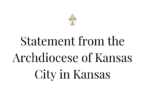by John Shultz
LEAVENWORTH — Contrary to the popular conceptions of the 16th president as a man of little religion, faith informed and impacted Abraham Lincoln’s private and public political lives, eminent Lincoln scholar and best-selling author Ronald White Jr. told a standing-room-only crowd at the University of Saint Mary here on Presidents’ Day, Feb. 15.
“Abraham Lincoln is the most respected president in our history,” White told the packed house at USM’s Xavier Theatre. “But that doesn’t necessarily mean we understand him.”
White, author of several books — including the New York Times best-seller “A. Lincoln: A Biography” — delivered the university’s 12th annual Lincoln Lecture.
White, a fellow at the Huntington Library in San Marino, Calif., and professor emeritus of American religious history at San Francisco Theological Seminary, maintained that Lincoln was a man of greater faith than conventional wisdom may hold. His lecture, entitled “Abraham Lincoln’s Journey of Faith,” sought to show how Lincoln came to a gradual embracing of religion.
“He pushed against his father’s religion,” White said. “As young people sometimes do, he pushed against his father.”
That youthful attitude saw Lincoln enter adulthood as a religious skeptic, eventually growing to embrace fatalism, a cousin to Thomas Jefferson’s deism, White said.
But tragedy pushed Lincoln to embrace a more traditional Christian faith, White argued. Personally, there were the twin tragedies of the deaths of Lincoln’s sons, Eddie and Willie. On a grander scale, there was the Civil War and its hundreds of thousands of casualties.
When Lincoln delivered what White called his last great speech — his second inaugural address in 1865 — his religiosity was on full display, White argued. The short, 700-word oration includes multiple references to God and the only inaugural citations of Scripture since John Quincy Adams.
White noted that Lincoln’s sermon-like speech was crafted in direct response to the ever-escalating anti-Southern sentiment that demanded vengeance for the Civil War.
“The people who came that day were full of anger,” White said. “They were angry at the South and they wanted Lincoln to give voice to their anger. . . . That’s what we do in times of war.”
Lincoln’s speech tried to push aside issues of blame, stressing, “Let us judge not, that we be not judged.”
And it emphasized, White said, “that Lincoln has a deep wellspring of faith that believes that forgiveness is possible.”
The Lincoln Lecture is an annual event at the University of Saint Mary, first established to promote USM’s De Paul Library Lincoln Collection. It is made possible by Country Club Bank of Leavenworth and Lansing, the event’s benefactor.






